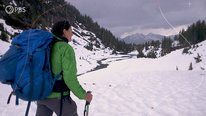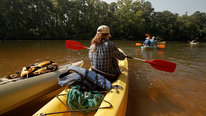- Nicholas Wiesenthal
- Ph.D. Student
- Exploring the Effect of Shared Identities Between Instructors and Students in the Undergraduate Biology Classroom
- Arizona State University
- Sara Brownell
- Professor
- Exploring the Effect of Shared Identities Between Instructors and Students in the Undergraduate Biology Classroom
- Arizona State University
- Carly Busch
- Ph.D. Student
- Exploring the Effect of Shared Identities Between Instructors and Students in the Undergraduate Biology Classroom
- Arizona State University
- Katelyn Cooper
- https://katelyncooper1.wixsite.com/bioedlab
- Assistant Professor
- Exploring the Effect of Shared Identities Between Instructors and Students in the Undergraduate Biology Classroom
- Arizona State University
Public Discussion
Continue the discussion of this presentation on the Multiplex. Go to Multiplex










Nicholas Wiesenthal
Ph.D. Student
Hello STEM For All! We are a team of researchers in the Research for Inclusive STEM Education Center at Arizona State University examining how to create more inclusive science learning environments. This project, funded by an NSF IUSE grant, explores the impact of LGBTQ+ science instructors revealing their identity to undergraduates. We are preparing to scale up our preliminary project by conducting a nationwide study; if you're an LGBTQ+ science instructor and interested in participating let us know by following this link here.
Remy Dou
Patti Parson
Given all that is happening around LGBTQ+ (esp T) in the states, was there any negative feedback (ie did any students complain to the admin? was the admin supportive? was the teacher safe) ?
Remy Dou
Shaundra Daily
Katelyn Cooper
Assistant Professor
Thanks for this important question! The instructor came out to her class in fall 2019 and in fall 2020, and fortunately received very positive responses from students. 66% of students reported it had a positive impact on them, 31% reported no impact and only 3% reported a negative impact. Students who said it had a negative impact reported it made them uncomfortable or distracted from the course content- there was no additional negative feedback or complaints and the instructor feels safe coming out at this particular institution. Encouragingly, 96% of the 475 surveyed students reported that they perceive it as appropriate for an LGBTQ+ instructor to come out in class.
Remy Dou
Jean Fahy
This is so great that the instructor coming out had a such a positive impact on the students and that the institution was supportive of this study. Curious of the results you will get in other parts of the country and if you will get any LGBTQ+ instructors volunteering in schools that they knew are not supportive of teachers coming out.
Remy Dou
Katelyn Cooper
Assistant Professor
Great question! For the past year, LGBTQ+ science instructors have been volunteering to participate in a study where they will come out one semester and not come out in another and we will assess student outcomes. Although we have volunteers from across the U.S., we have not yet collected any information about how participants perceive the supportiveness of their universities. However, this is an important factor that we do plan to assess as a part of the study!
Remy Dou
Brian Drayton
This is an interesting study, and I, too, will be interested in comparative data.
I have to say that when I was in college (now a rather long time ago), no instructor gave us any information about themselves, unless they ended up being a mentor/advisor. So a professor coming in and doing a thumbnail intro of themselves would have been memorable, even if no data about their sexual orientation had been mentioned. Students are usually positively affected, I think, when the instructor personallizes themselves.
So: Did you compare reactions to a control group in which the instructor gives a similar self-intro, but does not mention relationship status or similar?
Remy Dou
Katelyn Cooper
Assistant Professor
Yes! We are scaling up this pilot study to be a national study. In one semester the instructor will come out as described in the video, and in another semester the instructor will still share the same personal facts (e.g. favorite food, tv show, activity), but not mention anything about whether or not they are a member of the LGBTQ+ community. We are hoping this will shed light on the specific impact of coming out.
Remy Dou
LaShawnda Lindsay
Research Scientist
This is an interesting study. What were the demographics of the students? I am curious about intersectionality and how it may impact the study.
Although unrelated, I am curious about how this type self-disclose might impact the instructor's teaching evaluations.
Katelyn Cooper
Assistant Professor
Thanks for these questions. Regarding demographics, 15% identified as members of the LGBTQ+ community. Participants were primarily women (66%) and white (44%). While about 25% identified as Christian, 45% identified as either atheist, agnostic, or not religious. We agree that examining intersectionality will be very important and are hoping that scaling this study across the U.S. will provide us with enough student participants to examine intersecting identities.
Anecdotally, we can say that the instructor of this study has never received any negative feedback on her teaching evaluations regarding her LGBTQ+ identity, and in general her scores are quite high. However, we look forward to hearing what other instructors have to say as we scale this work!
Remy Dou
Assistant Professor
Thank you for your contributions to the video showcase. I resonate with many of the statements above. I share similar curiosities as those described and I'm eager to learn more. Thanks, again!
Harrison Pinckney
Assistant Professor
Major kudos for 1) positioning doctoral students to be showcased in this presentation, 2) focusing on LGBTQIA+ identity, and 3) amplifying the voices of students. I think it is great that you are already considering the expansion of this work. Does this study explore LGBTQIA+ identity formation and how the socialization process might impact perspectives of STEM? This could add a rich discussion to an already wonderful project.
Amy Robertson
Katelyn Cooper
Assistant Professor
No, LGBTQIA identity formation and the impact of the socialization process particularly within STEM has not been explored. However, we have explored these ideas to some extent in earlier projects: https://www.lifescied.org/doi/10.1187/cbe.16-01...
Amy Robertson
So grateful for this presentation! I'm gathering from your video that the framing of this instructor sharing their LGBTQ+ identity was part of getting to know them -- shared amongst a variety of information about them. Would love to know more about the context, whether this identity and how it's shaped the instructor's experience in the discipline was explored more, etc. I love when instructors bring in their positionalities and so am curious about different ways this happens in practice.
Katelyn Cooper
Assistant Professor
In prior studies we found that instructors worried coming out would take away valuable class time. So, we wanted to have the instructor come out very briefly so that we could assess the impact of a short intervention. In this case, the instructor only mentioned that she was a "member of the LGBTQ+ community" in < 3 seconds, once at the beginning of the class. She did not mention the identity again.